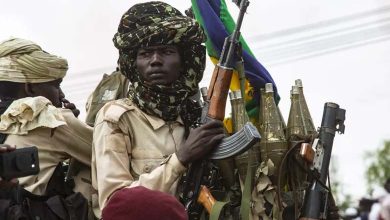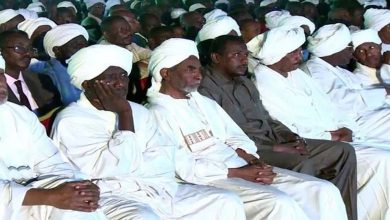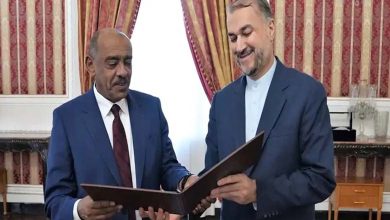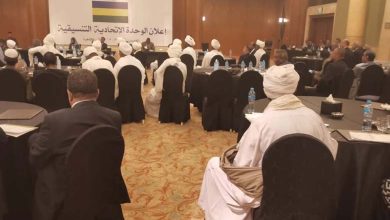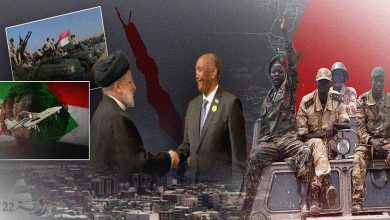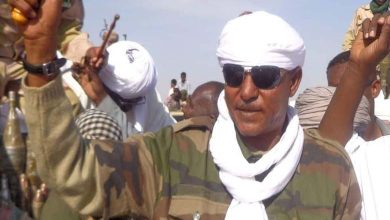Iranian advisors and technicians on Sudanese soil.. why?
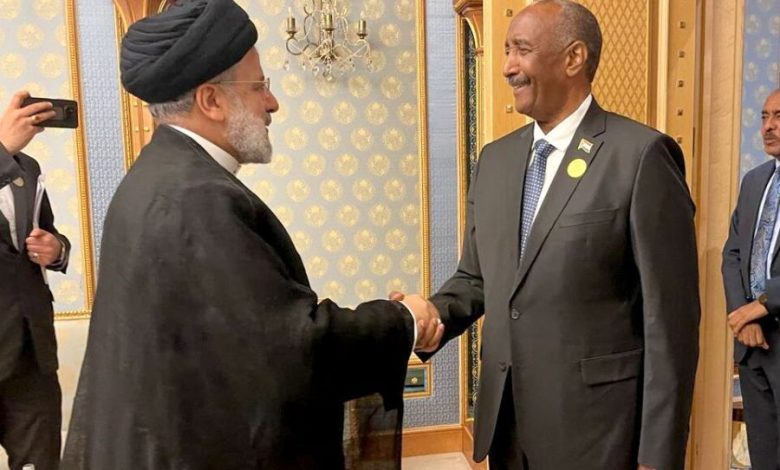
It seems that the widely circulated video on January 7, 2024, showing elements of the Rapid Support Forces carrying debris of a drone, could turn into evidence of Iran’s involvement in fueling the conflict in Sudan.
Bloomberg reported Wednesday testimonies from experts confirming that the debris belonged to a “Mohajer 6” drone, manufactured in Iran by the Qods Aviation Industries.
Senior Western officials revealed that Iran was supplying the Sudanese army with drones, according to Bloomberg.
Three Western officials, who requested anonymity, stated that “Iran was supplying the Sudanese army with drones, and Sudan was receiving shipments of Mohajer 6 drones.”
On January 6, a spokesperson for the Rapid Support Forces announced that their forces had shot down a Sudanese army drone in Khartoum, followed by the circulation of videos showing drone wreckage.
أسقط أشاوس قوات الدعم السريع بالعاصمة الخرطوم اليوم السبت ، طائرة حربية من طراز (ميغ) تابعة لمليشيا البرهان وفلول النظام البائد الإرهابيين.
وتصدى أشاوس الدعم السريع، لاعتداءات فلول النظام البائد على المدنيين الأبرياء بإسقاط طائرة حربية من طراز (ميغ) تناثر حطامها في منطقة شرق… pic.twitter.com/9vAcxgVhtz
— Rapid Support Forces – قوات الدعم السريع (@RSFSudan) January 6, 2024
Bloomberg cited Dutch drone expert Wim Zwijnenburg as saying that “among the evidence of a Mohajer 6 drone’s presence in Sudan is a satellite image captured on January 9 of the aircraft at Wadi Sayyidna Air Base, north of Khartoum.”
The video reignited debate about Iran’s role in the ongoing war between the Sudanese army and the Rapid Support Forces since April 15, 2023, especially after the resumption of diplomatic relations between Sudan and Iran.
In October 2023, the Sudanese Ministry of Foreign Affairs announced that Khartoum and Tehran had officially restored diplomatic relations, following a hiatus that began in January 2016 due to the Saudi embassy attack in Tehran.
A paved path
While the Sudanese Ministry of Foreign Affairs was in open disagreement with several countries such as Chad and some Sudanese neighbors affiliated with the Intergovernmental Authority on Development in Eastern Africa (IGAD), it announced the resumption of relations with Tehran after a seven-year hiatus. This raised questions about the viability and significance of this step in the context of the ongoing war in Sudan.
For Mahir Abu Joukh, a leader of the Freedom and Change coalition, “the restoration of relations between Sudan and Iran is part of the Sudanese army’s plans to seek military equipment, especially after the Rapid Support Forces seized military bases and economically and militarily significant cities.”
⭕️ سقوط مسيرة من نوع مهاجر 6 ايرانية الصنع ..#الدعم_السريع_مليشيا_ارهابيه pic.twitter.com/GTjF9LthzU
— درويش ®️ (@Derwish249) January 6, 2024
Joukh emphasized that “Al-Burhan failed during his foreign tours to obtain the weapons that were the main objective of his visits, and therefore turned to Iran to provide military equipment.”
The leader of the Freedom and Change coalition insisted that “Iran will not provide weapons to Sudan without compensation, as it does with Hezbollah, the Syrian regime, and the Houthis in Yemen, because it sees Sudan as a market for weapons, helping it overcome its escalating economic difficulties, especially since Sudan’s acquisition of weapons through official channels involves many complications.”
The United Nations Security Council imposed an arms embargo on the Sudanese government and armed factions in Darfur on March 29, 2005, due to the war that broke out in the region in 2003, and the Council continues to renew its resolution annually.
Former Sudanese Navy Commander Admiral Fatah al-Rahman Mahi al-Din considered that “the restoration of relations between Khartoum and Tehran is a natural step, based on common interests, and comes within the framework of Sudan’s openness to friendly countries.”
Mahi al-Din said, “We were against Iran in response to Saudi Arabia’s will, and now there are many changes, and Saudi Arabia itself has restored its relations with Iran.”
The former Sudanese Navy commander stressed that “the external sanctions imposed on Sudan compelled it to seek new paths in its foreign relations.”
He added, “It is natural for Sudan to turn eastward due to Western and American sanctions… It is not reasonable for me to be sanctioned and asked to sever my relations with Eastern countries.”
In 2014, Iranian cultural centers in Sudan were closed, with Khartoum justifying its decision citing increased activity of these centers in spreading the Shiite school in Sudan, where most Sudanese adhere to the Sunni school, according to a previous report by Agence France-Presse.
The moves of the previous regime
Contrary to the belief of the former Sudanese Navy Commander, General Fatah al-Rahman Mahi al-Din, who linked the resumption of relations between Khartoum and Tehran to the restoration of ties between Saudi Arabia and Iran, political analyst Ashraf Abdelaziz believes that “elements of the ousted President Omar al-Bashir‘s regime played an influential role in weaving the Sudanese-Iranian rapprochement.” This is because they have become more influential in decision-making, especially in the military realm in Sudan, since the outbreak of fighting between the army and the Rapid Support Forces.
According to Abdelaziz, “leaders of the Muslim Brotherhood in Sudan succeeded in ending the rift between Khartoum and Tehran, despite the strains resulting from Sudan’s involvement in the war against the Houthis, strategic allies of Iran.”
He pointed out that the end of the rift came after a series of secret meetings, primarily aimed at ensuring military support for the army in its war against the Rapid Support Forces.
The political analyst suggested that “the appearance of Iranian drones in Sudanese skies could be the result of the rapprochement between the Sudanese army and Tehran.”
In contrast, Iranian political analyst Hussein Royvaran believes that “the restoration of relations between Khartoum and Tehran is a diplomatic step within Iran’s plan to open up to its geographical neighborhood.”
Royvaran told “Al-Hurra” that “the resumption of relations between the two parties is a diplomatic event that does not have a major impact, firstly due to Sudan’s internal situation, and secondly because it comes at a time when other priorities are emerging in the region, especially the issue of Gaza and its repercussions on the region.”
He did not comment on reports that Iran would supply the Sudanese army with military equipment, merely saying, “In my view, the event of the resumption of relations may not attract much attention because its impact is limited, and it is not a priority in the region.”
However, what Iranian political analyst Royvaran considers insignificant and non-priority due to the ongoing war in Sudan, Abdelaziz sees as the cornerstone of the current rapprochement between Tehran and Khartoum.
Abdelaziz said that “Iran is trying to capitalize on the fragility experienced by Sudan due to the war, in order to expand its influence in the Red Sea region, ensuring the protection of its allies in Yemen and influencing navigation operations in the Red Sea, in addition to revitalizing the arms supply route to Gaza, as was happening through its alliance with the ousted regime of President Omar al-Bashir.”
Evidence suggests that Iran played a key role in supporting the weapons production sector in Sudan, according to a report released by the Small Arms Studies Institute in Switzerland in May 2014.
Coastal ambitions?
Amid the ongoing war in Gaza, steps toward Sudanese-Iranian rapprochement have accelerated, and Tehran seems to have overlooked its resentment toward Khartoum due to its participation in Operation Decisive Storm as part of the coalition to restore legitimacy in Yemen. What drives Tehran to resume relations with Khartoum?
Here, Freedom and Change movement leader Mahir Abu Joukh rules out that Iran has ambitions in the eastern region of Sudan, which borders the Red Sea. He argues that “any Iranian ambitions in this region could provoke the anger of Saudi Arabia and the Gulf states, and Tehran does not want to jeopardize its relations with Riyadh, which have recently improved,” according to him.
However, Abu Joukh went on to say that “multiple international reports have indicated that Iran and the ousted regime of Omar al-Bashir were involved in transferring weapons to the Hamas movement, classified as a terrorist group by the United States and several other countries.”
He added, saying, “When the al-Bashir regime was financing Hamas with weapons, some of these weapons were Sudanese-made, while the other part was done with the involvement of Iranian experts. Today, there is an attempt to revive the smuggling route, after it remained frozen over the past years.”
Former Sudanese Navy Commander General Fatah al-Rahman Mahi al-Din indicated that “Iran did not ask Sudan, when relations were strong and solid, to establish a military base in the Red Sea, and it showed no interest in this regard.”
He emphasized that there was a Russian-Sudanese agreement to establish a base in the Red Sea, but this agreement was frozen.
Mahi al-Din added, “However, if Iran currently requests the establishment of a military base in the Red Sea, that is possible, and the Sudan-Russia agreement could be activated, as long as America and the West continue to impose sanctions on Sudan.”
In contrast, political analyst Abdelaziz believes that “Iran’s primary desire in approaching Sudan is to extend its influence in the Red Sea region, considered a zone of regional conflict, especially after the outbreak of the war in Gaza.”
Abdelaziz stated that “the Sudanese-Iranian rapprochement will bring to the Israeli Mossad’s memory that the coastal region of the Red Sea, on the Sudanese border, was an active area and a strategic passage for arms smuggling to Hamas, which could raise concerns among Israelis.”
The political analyst pointed out that “Iran has strong and robust relations with the Sudanese army,” a claim confirmed by former Sudanese Navy Commander General Fatah al-Rahman Mahi al-Din, who emphasized that there is military cooperation between Khartoum and Tehran, denying at the same time the existence of a common defense agreement between the two parties.”
He added, saying, “Any talk of Sudan’s involvement in arms trafficking to Gaza is a baseless accusation because Sudan has no direct borders that could be used for arms trafficking to there.”
Mahi al-Din denied that Khartoum has received any arms shipments from Iran at the present time, stating that “what the Rapid Support Forces are propagating about shooting down an Iranian drone in Khartoum is nonsense and lies.”
Previous foreign reports have indicated Sudanese-Iranian coordination in arms delivery to Palestinian factions, using the Red Sea coast and Sudanese borders.
In March 2009, Reuters reported, citing two senior Sudanese officials, that a convoy suspected to be arms smugglers was attacked by unidentified aircraft while heading from eastern Sudan to Egypt, resulting in the deaths of most convoy members.
In October 2012, the Sudanese government accused Israel of bombing the military industries complex in the Al-Yarmouk area in Khartoum, using four planes, claiming that the attack resulted in the deaths of two individuals.
At the time, the Yedioth Ahronoth newspaper reported that Israel “has definite information about the existence of Iranian military bases in Khartoum, and that the Al-Yarmouk factory produces weapons intended for Hamas.” In a report, the Jerusalem Post mentioned that Sudan had been within Iran’s reach for decades by using the country as a base for arms trafficking in the region, with weapons escaping to Hamas in 2009, 2012, and 2014.
Normalization and implications of rapprochement
For many years, Sudan has been among the countries refusing to reconcile with Israel, thus bolstering the prospects of Khartoum’s rapprochement with Tehran, especially during al-Bashir‘s era. However, in February 2020, Sudan’s Sovereignty Council President Abdel Fattah al-Burhan took rare steps towards normalization by meeting Israeli Prime Minister Benjamin Netanyahu in Uganda. What will be the fate of normalization after the Sudanese-Iranian rapprochement?
Mahir Abu Joukh, a leader in the Freedom and Change movement, states that al-Burhan will continue to weave and develop relations with Israel, and that the normalization process will not stop as long as al-Burhan leads the Sudanese army because he believes that friendship with Israel represents a source of strength for him.
At that time, the spokesperson for the Sudanese army announced support and welcomed al-Burhan and Netanyahu’s meeting, considering it “a step in the Sudan’s supreme interest”.
On the other hand, former Sudanese Navy Commander Rear Admiral Fatah al-Rahman Mahi al-Din believes that relations with Tehran are in the stage of formation and that it is premature to speculate on the fate of this step, anticipating that the return of relations will have a prospective impact on economic and trade areas between the two countries.
This is where political analyst Ashraf Abdelaziz comes back, emphasizing that the Iranian rapprochement will come as a counter to the fate of normalization undertaken by al-Burhan, as former regime leaders have gained increased influence over the decisions of the military institution.
He added, stating: “I do not expect the normalization steps to move forward, but rather that Eastern Sudan and the Red Sea coast will become an area of regional and international conflict, given the suicidal action taken by Khartoum in resuming its relations with Iran.”
Abdelaziz downplayed any potential economic impact of the Sudanese-Iranian rapprochement, noting that “Iran was not a strong economic support for Sudan, even when the relationship was flourishing and strong between the two parties.”
He also added that “Iran did not fulfill its commitment to build the road intended to link the mountain region to the city of Malakal, located in southern Sudan, although the completion of this road could have contributed to maintaining Sudan’s unity and perhaps reducing the chances of separation of South Sudan, which suffered from a lack of balanced development.”




